| Srl | Item |
| 1 |
ID:
006613
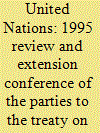

|
|
|
|
|
| Publication |
New York, United Nations, 1996.
|
| Description |
ix, 400p.
|
|
|
|
|
|
|
|
|
|
|
|
Copies: C:1/I:0,R:0,Q:0
Circulation
| Accession# | Call# | Current Location | Status | Policy | Location |
| 038364 | 355.825119/UNI 038364 | Main | On Shelf | General | |
|
|
|
|
| 2 |
ID:
005749
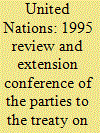

|
|
|
|
|
| Publication |
New York, United Nations, 1995.
|
| Description |
576p.
|
| Contents |
Part I: Organisation and work of the conference
Part II: Documents issued at the conference
|
|
|
|
|
|
|
|
|
|
|
|
Copies: C:2/I:0,R:0,Q:0
Circulation
| Accession# | Call# | Current Location | Status | Policy | Location |
| 037087 | 355.825119/UNI 037087 | Main | On Shelf | General | |
| 037088 | 355.825119/UNI 037088 | Main | On Shelf | General | |
|
|
|
|
| 3 |
ID:
061423
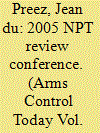

|
|
|
| 4 |
ID:
100991
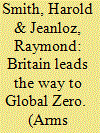

|
|
|
|
|
| Publication |
2010.
|
| Summary/Abstract |
The United Kingdom, not the United States or Russia, is leading the way along a path to a possible world without nuclear weapons. The British not only are reducing the number of nuclear weapons, but in so doing are making an implicit statement, through the resultant force posture, about the kind of deterrence that nuclear weapons provide. Can and should the superpowers follow the same path?
|
|
|
|
|
|
|
|
|
|
|
|
|
|
|
|
| 5 |
ID:
110600
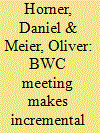

|
|
|
|
|
| Publication |
2012.
|
| Summary/Abstract |
The 2011 Biological Weapons Convention (BWC) Review Conference ended Dec. 22 with participants generally saying they were satisfied with the consensus agreement on a final document but with many expressing some disappointment that the conference failed to adopt significant changes in the treaty regime.
|
|
|
|
|
|
|
|
|
|
|
|
|
|
|
|
| 6 |
ID:
053798
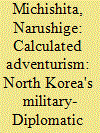

|
|
|
| 7 |
ID:
146545
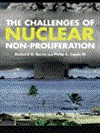

|
|
|
|
|
| Publication |
Lanham, Rowman and Littlefield, 2015.
|
| Description |
xvi, 238p.pbk
|
| Series |
Weapons of Mass Destruction Series; 2
|
| Standard Number |
9781442223752
|
|
|
|
|
|
|
|
|
|
|
|
Copies: C:1/I:0,R:0,Q:0
Circulation
| Accession# | Call# | Current Location | Status | Policy | Location |
| 058759 | 327.1747/BUR 058759 | Main | On Shelf | General | |
|
|
|
|
| 8 |
ID:
077072
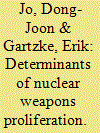

|
|
|
|
|
| Publication |
2007.
|
| Summary/Abstract |
Nuclear weapons proliferation is a topic of intense interest and concern among both academics and policy makers. Diverse opinions exist about the determinants of proliferation and the policy options to alter proliferation incentives. We evaluate a variety of explanations in two stages of nuclear proliferation, the presence of nuclear weapons production programs and the actual possession of nuclear weapons. We examine proliferation quantitatively, using data collected by the authors on national latent nuclear weapons production capability and several other variables, while controlling for the conditionality of nuclear weapons possession based on the presence of a nuclear weapons program. We find that security concerns and technological capabilities are important determinants of whether states form nuclear weapons programs, while security concerns, economic capabilities, and domestic politics help to explain the possession of nuclear weapons. Signatories to the Treaty on the Non-Proliferation of Nuclear Weapons (NPT) are less likely to initiate nuclear weapons programs, but the NPT has not deterred proliferation at the system level.
|
|
|
|
|
|
|
|
|
|
|
|
|
|
|
|
| 9 |
ID:
113751
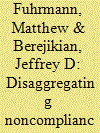

|
|
|
|
|
| Publication |
2012.
|
| Summary/Abstract |
Why do states make disingenuous treaty commitments? Under what conditions will countries refrain from entering cooperative agreements with which they do not expect to comply? This article addresses these questions by analyzing how states that are pursuing nuclear weapons treat the nuclear Nonproliferation Treaty (NPT). The authors develop a distinction between two types of noncooperative behavior. The first is cheating while part of the NPT (predation) and the second is pursuing nuclear weapons outside of the treaty (abstention). The authors' argument is that democratic proliferators are more likely to abstain because executives in democracies are domestically constrained to a greater degree than authoritarian leaders. Statistical tests in a sample of all countries with active nuclear weapons programs from 1968 to 2004 provide evidence in favor of our argument. Controlling for confounding variables and the factors that motivate states to pursue nuclear weapons, the results show that states with greater constraints on executive authority are less likely to choose predation. Yet, electoral mandates do not appear to dissuade governments from making disingenuous treaty commitments. These findings have important implications for nuclear proliferation, the credibility of international commitments, and efforts to link domestic political institutions with international outcomes.
|
|
|
|
|
|
|
|
|
|
|
|
|
|
|
|
| 10 |
ID:
128074
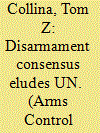

|
|
|
|
|
| Publication |
2013.
|
| Summary/Abstract |
As they complete their annual debate on disarmament and international security, the member states of the United Nations continue to struggle to agree on where to focus their efforts. The next logical step for many, a global ban on the production of fissile materials for nuclear weapons, has been effectively blocked by Pakistan.
Meanwhile, international support is growing to move directly to the elimination of nuclear weapons, which the declared nuclear powers oppose.
|
|
|
|
|
|
|
|
|
|
|
|
|
|
|
|
| 11 |
ID:
148039
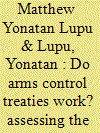

|
|
|
|
|
| Summary/Abstract |
How do international arms control treaties influence state policies? This article investigates this question by analyzing the efficacy of the nuclear Nonproliferation Treaty (NPT). Despite fierce debate over the last several decades, scholars still lack a full understanding of whether or not the treaty “works.” This debate persists, in part, because existing studies suffer from a key limitation: they are not designed to infer a causal connection between NPT membership and nuclear proliferation. Prior research cannot determine whether membership in the treaty restrains states from developing nuclear weapons or simply reflects existing preferences. To address this limitation, this article accounts for selection effects by using a measure of states’ ex ante treaty commitment preferences. Our analysis of nuclear proliferation from 1970 to 2000 provides evidence that the NPT has played a key role in curbing the spread of nuclear weapons. Even after accounting for strategic selection into the treaty, NPT ratification is robustly associated with a lower likelihood of pursuing nuclear weapons. Our results not only matter for debates over the NPT and nonproliferation but also have broad implications for the study of how international institutions affect international politics.
|
|
|
|
|
|
|
|
|
|
|
|
|
|
|
|
| 12 |
ID:
069249
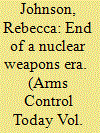

|
|
|
| 13 |
ID:
077680
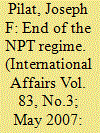

|
|
|
|
|
| Publication |
2007.
|
| Summary/Abstract |
In the context of rising regional instability and conflict, along with increased incidents of global terrorism, in a dynamic, uncertain security environment, emerging nuclear and other weapons of mass destruction threats-both state proliferation and terrorism-are seen as growing dangers giving rise to increasing global insecurity. The international nuclear nonproliferation regime, the centerpiece of which is the Nuclear Non-proliferation Treaty (NPT), is essential to current and future non-proliferation efforts and needs to be maintained and strengthened, not replaced. The normative and legal weight of the regime is important for counterterrorism as well as non-proliferation, but it will not likely directly affect the behaviour of so-called 'rogue states' and terrorists. Preventing them from achieving their objectives if they attempt to wield nuclear and radiological weapons may deter and dissuade them, as may a credible prospect of punishment. The interaction of non-proliferation and deterrence, so clear during the Cold War history of the NPT, remain crucial parts of an increasingly complex picture
|
|
|
|
|
|
|
|
|
|
|
|
|
|
|
|
| 14 |
ID:
089175
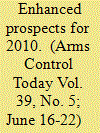

|
|
|
| 15 |
ID:
128329
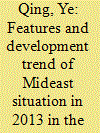

|
|
|
|
|
| Publication |
2013.
|
| Summary/Abstract |
The situation in Middle East is full of twists and turns in 2013, demonstrating a transitional character of the transformation of regional architecture. It has projected a certain extent of inheritance on the one hand and some tendencies for future development on the other. The adjustment of Mideast regional architecture will be shaped in the process of continuous rivalry between the new and old forces, the mutual adaptation of new and old modes and constant interaction between big powers and regional countries.
|
|
|
|
|
|
|
|
|
|
|
|
|
|
|
|
| 16 |
ID:
138548
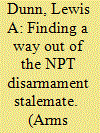

|
|
|
|
|
| Summary/Abstract |
On the eve of the 2015 Nuclear Nonproliferation Treaty (NPT) Review Conference, there is a stalemate on nuclear disarmament issues between the NPT non-nuclear-weapon states and nuclear-weapon states. That stalemate is typified by controversy over the new focus of the non-nuclear-weapon states on the humanitarian impact of nuclear weapons; lack of agreement among NPT parties on how best to advance nuclear disarmament, heightened by widespread frustration with the slow pace of achieving the nuclear disarmament goals of Article VI of the NPT; and the attraction of calls to negotiate a nuclear weapons ban even without the participation of the nuclear-weapon states. The review conference is an opportunity for all NPT parties to agree on a way forward to break this stalemate and advance cooperatively the treaty’s goal of nuclear disarmament.
|
|
|
|
|
|
|
|
|
|
|
|
|
|
|
|
| 17 |
ID:
097193
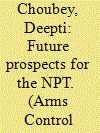

|
|
|
| 18 |
ID:
087204
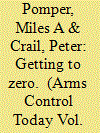

|
|
|
|
|
| Publication |
2009.
|
| Summary/Abstract |
Evans has held a long career in international security and arms control issues, as Australia's foreign minister during 1988-1996 and as the current president and chief executive officer of the International Crisis Group, a position he has held since 2000. Arms contrl today met with Evans Feb 12 to discuss the work of the commission and his perspective on the issue it will be addressing.
|
|
|
|
|
|
|
|
|
|
|
|
|
|
|
|
| 19 |
ID:
075799
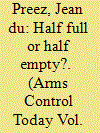

|
|
|
| 20 |
ID:
078557
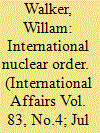

|
|
|
|
|
| Publication |
2007.
|
| Summary/Abstract |
The article'Nuclear enlightenment and counter-enlightenment by William Walker opened the special issue of International Affairs which was published in May 2007. In it, he claimed that the United States departed in the late 1990s and early 2000s, at the height of its hegemonic influence, from a conception of international nuclear order that it had held to, with few interruptions, over several decades. By so doing, it contributed substantially to the order's currently perceived demise. In responding to criticisms from other participants in the special issue, William Walker defends his arguments while acknowledging the enlightenment trope's fragility; reemphasizes the essential contractual nature of the Nuclear Non-Proliferation Treaty (NPT) which some critics denied; stresses the order's reliance on a judicious balancing (which has temporarily been lost) of realist and constitutional strategies; rejects assertions that the NPT is not a disarmament treaty; argues that the'muddling through'advocated by some authors cannot suffice; and offers reasons why the despondency of several among them may have been overplayed, and why a new phase of consolidation of order might (just might) lie ahead, not least because of the reconsideration of US international strategies that has begun and the widely perceived urgency of preventing further proliferation and avoiding a resumption of arms racing.
|
|
|
|
|
|
|
|
|
|
|
|
|
|
|
|